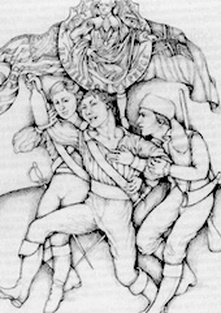|
J. William T. "Bill" Youngs, American Realities, Volume One:
Historical Episodes from First Settlements to the Civil War, Chapter Six |
"Washington Crossing the Delaware" by Emanuel Leutze
Courtesy of the Wikipedia Commons |
6. The American Revolution
|
Summary |
|
In earlier chapters of American Realities we saw that colonists hesitated to consider themselves American: William Byrd had difficulty locating himself in England and America, and Jonathan Boucher was alienated from the Revolutionary movement. In this chapter we meet a group of men and women who have crossed the psychological threshold to America and cast their fortunes with independence. But the revolutionaries — George Washington, Joseph Hodgkins, and Lydia Minturn Post, among others — found that independence required both a state of mind and an exercise of will. The essay presents the military history of a largely disastrous year, while showing the evolution of an American sense of beleaguered rectitude — of courage in the face of tremendous odds — expressed most clearly by Nathan Hale and Thomas Paine.
|
Author reads from the Text
To participate in the Revolutionary War in the year of independence was to be at one moment a soldier in a victorious army of well-disciplined soldiers, at another a refugee in a disorderly rout of farmers and artisans. Sometimes independence was as real as the stone walls of New England or the orderly plantations of the South. At other times it was as insubstantial as a dimly remembered dream.
The Continental army was both the symbol and the agent of that dream. The vision of national independence, of an “equal station” in the world, became a reality when the army worked. And “working” involved creating confidence as well as winning battles. It was largely because of his dignified presence—of his ability, that is, to inspire confidence—that George Washington had been chosen commander in chief. When in 1775 the Continental Congress determined that there should be a national army to fight the British, the tall, distinguished southerner was an obvious choice. As an aristocratic planter, his social standing would dignify the Revolution. His Virginia background accentuated the continental character of the Revolution that had begun in Massachusetts.
Washington’s political moderation made him acceptable to a broad spectrum of political opinion. And his forty-three years gave him the experience to lead the new Revolutionary army and the vigor to stay on the job. Additionally, he impressed his colleagues in the Congress as a man with “an easy soldier-like air.” The impression was no doubt encouraged by his garb: he came to the Congress dressed in an ill-fitting uniform he had worn more than two decades before in the Virginia militia. Thus George Washington became commander in chief. He accepted the appointment with characteristic modesty, protesting his limitations and offering to serve without pay. He wrote Martha that he hoped to be home soon, having no way of knowing that the war would drag on for almost a decade or that he would see Mount Vernon only twice in the next eight years.
The Continental army was both the symbol and the agent of that dream. The vision of national independence, of an “equal station” in the world, became a reality when the army worked. And “working” involved creating confidence as well as winning battles. It was largely because of his dignified presence—of his ability, that is, to inspire confidence—that George Washington had been chosen commander in chief. When in 1775 the Continental Congress determined that there should be a national army to fight the British, the tall, distinguished southerner was an obvious choice. As an aristocratic planter, his social standing would dignify the Revolution. His Virginia background accentuated the continental character of the Revolution that had begun in Massachusetts.
Washington’s political moderation made him acceptable to a broad spectrum of political opinion. And his forty-three years gave him the experience to lead the new Revolutionary army and the vigor to stay on the job. Additionally, he impressed his colleagues in the Congress as a man with “an easy soldier-like air.” The impression was no doubt encouraged by his garb: he came to the Congress dressed in an ill-fitting uniform he had worn more than two decades before in the Virginia militia. Thus George Washington became commander in chief. He accepted the appointment with characteristic modesty, protesting his limitations and offering to serve without pay. He wrote Martha that he hoped to be home soon, having no way of knowing that the war would drag on for almost a decade or that he would see Mount Vernon only twice in the next eight years.

